The Lesser Word - Sanity Restoring Books
 thelesserword
1 year ago
thelesserword
1 year ago
Before midnight update. I decided to write this tribute after reading from about a miracle from one of the parish libraries. There are sensitive groups in this world who hate the Faith, but it doesn't matter how they feel, since it's our duty to pray for our enemies anyways.
 thelesserword
1 year ago
thelesserword
1 year ago
Even if they use the same trick of betraying God to bow to idol-worshipping authorities to deliver the faithful up for death, well there's a point missing from a lot of modern (read also, athiest) Christians today. No matter how one is healed, if one healed is called to die for Christ, then they must die for love of God, and love for those wishing to execute them.
 thelesserword
1 year ago
thelesserword
1 year ago
Zooming through this piece, it almost makes me weep inside over how far Christianity has devolved from its roots. The Catholic Church still retains its sanity, but I live in the States, so watching Christians here is like watching a bunch of sheep led around by a wolf they forgot ate their cousins.
 thelesserword
1 year ago
thelesserword
1 year ago
When I speak of this sheep, I speak of those outside of Catholicism, most specifically Rapture-believing Evangelicals and their heresies (check what rhymes in the blanks of this poem). On this, honestly, the solution's the same for the wolves. Pray, pray, pray. We could spend our whole lives nagging about those who hate us, but the only way to fight them is oro et laboras: pray and work.
 thelesserword
1 year ago
thelesserword
1 year ago
My doc is about to hit 19000 words. Maybe I could still publish if I claim the editor's version more polished than the Neocities release. With a bit of Marketing magic, maybe I could be convinced to buy that which I myself should do for free: writing.
 thelesserword
1 year ago
thelesserword
1 year ago
Still, a book's only worth buying if it's helpful. Some authors claim that morals are unnessecary for a good story, but if morals aren't there then what else should a story convey? Write is right, what are you writing? Well this here's enough rambling from me. God be with.
 thelesserword
1 year ago
thelesserword
1 year ago
Wait, nevermind. I'm back for more. Growing up, I wanted to be a Youtuber... a gaming Youtuber. So like, share, and subscribe if you wish to see more. Bleh, it's corporate jargon now, but back then, we really meant it. For any creator, it's edifying, knowing that something you made could have affected someone positively in some way. It's a shame that those days, the 2010s, have passed to corporate plans.
 thelesserword
1 year ago
thelesserword
1 year ago
It's not like corporations are inherently bad though. It's just the way things are. A creation starts off good, but time corrupts as the Devil gets his hands in it. Every "evil" corporation today started with a good mission. One may probably guess why they removed those missions from their portfolio. When one no longer has to be responsible to what they promised under God, they can just do whatever they want.
 thelesserword
1 year ago
thelesserword
1 year ago
Nothing lasts forever though, and, I'll confess that I wait with a bit of excitement for the day when the major companies of my day collapse. When they go down, I wonder who shall go up. Same companies, same things, but if we get something new, then we'll have new companies and new things. This should be all now. I've got to eat, since it's St. Peter and Paul's feast day. God be with.
 thelesserword
1 year ago
thelesserword
1 year ago
Assembled furniture with my Pa today. Wasn't too bad. I'm just mad because I think Instagram's causing me to lose a bunch of brain cells. There's got to be demons attached to that platform. Never again. I'd rather work a regular job than be Internet famous. This place is cool though.
 thelesserword
1 year ago
thelesserword
1 year ago
Oh, and since I don't like extraneous interpretations, I'll just leave why I wrote it in the comments. https://thelesserword.neocities.org/Poetry-Pages/Volume-2/52.02
 thelesserword
1 year ago
thelesserword
1 year ago
Short one this time. Instagram might have ruined affirmational poetry for me, but I like these lines. Scrolling through that site makes me feel like an enemy of the whole church though if we're going by what I think: Protestants, Catholics, the whole world. Sometimes I feel that the reason why there's so many athiest today is because Christians now are practically athiest by the Latin, "Without God, godless."
 thelesserword
1 year ago
thelesserword
1 year ago
I'll comment on the page. I keep clicking "Comment" and losing what I meant to say.

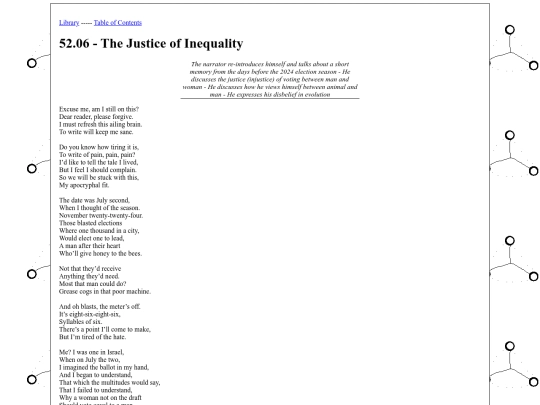

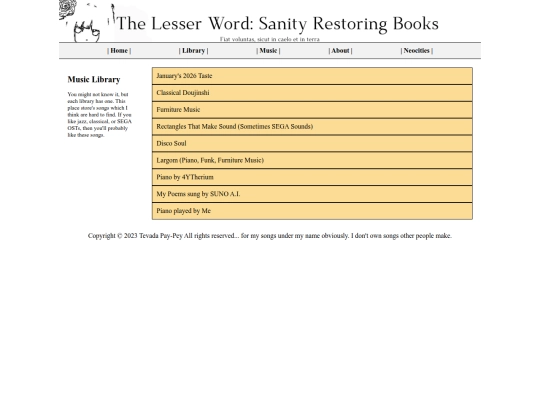
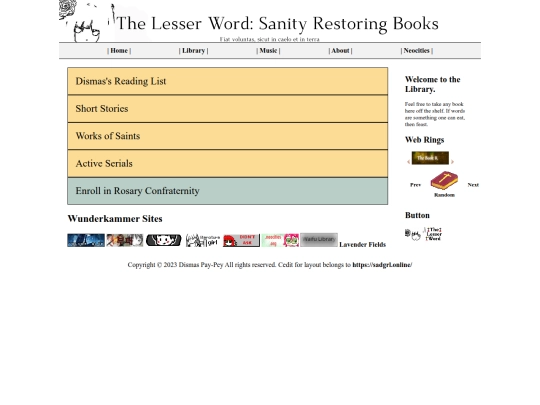
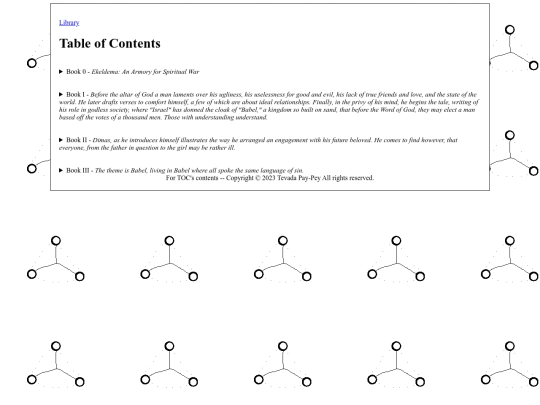
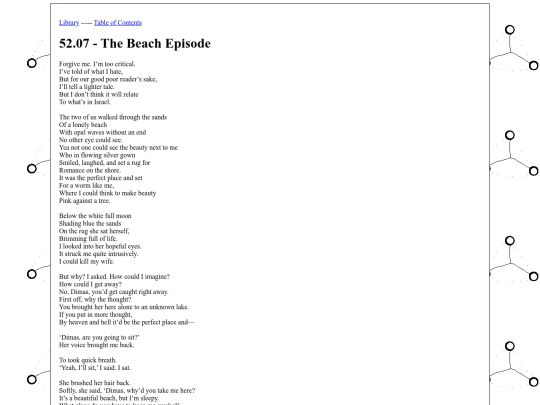
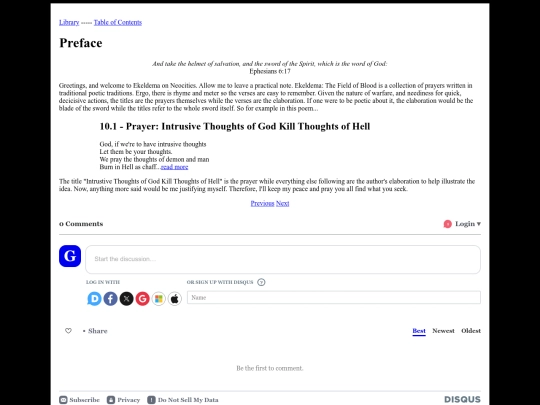
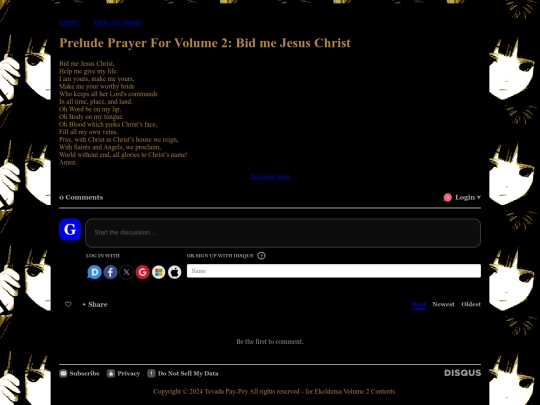
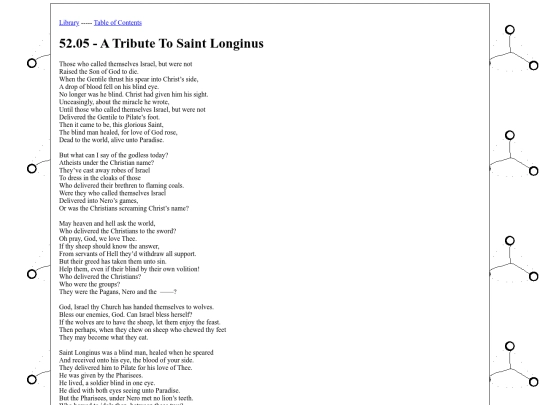
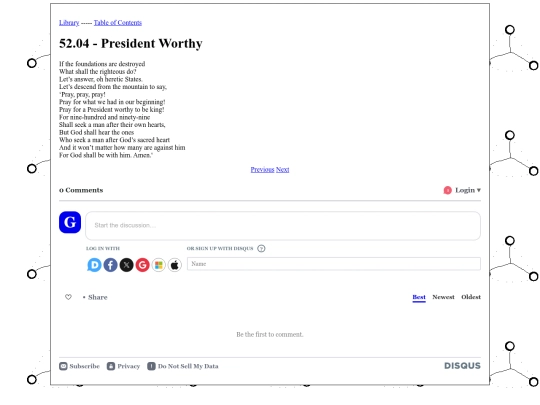
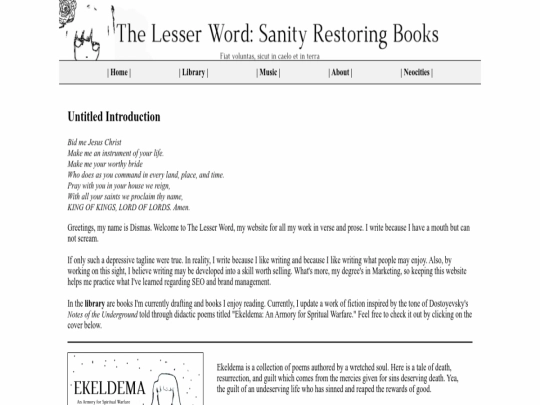
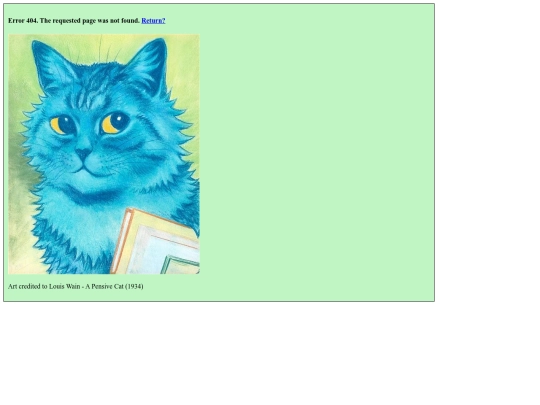

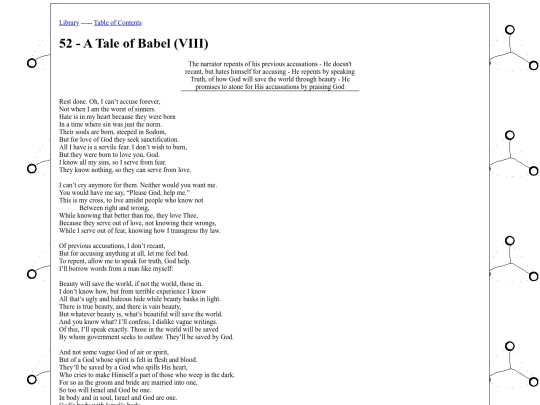

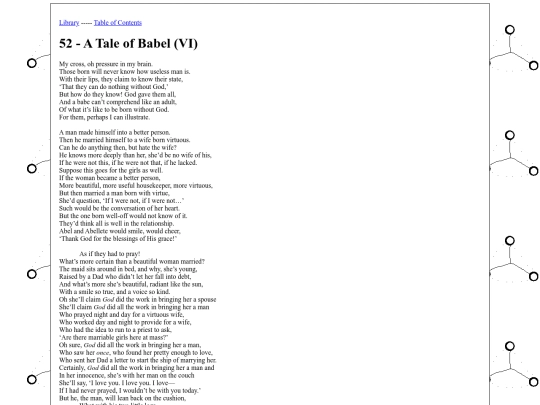
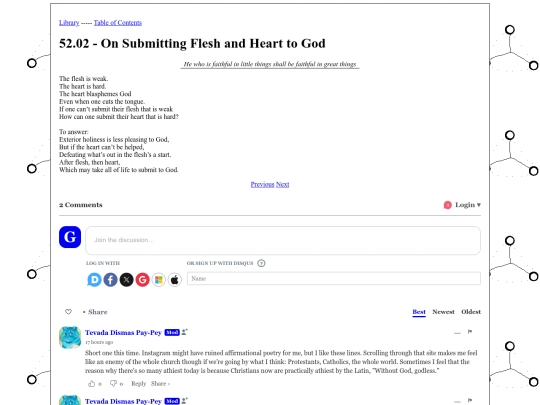

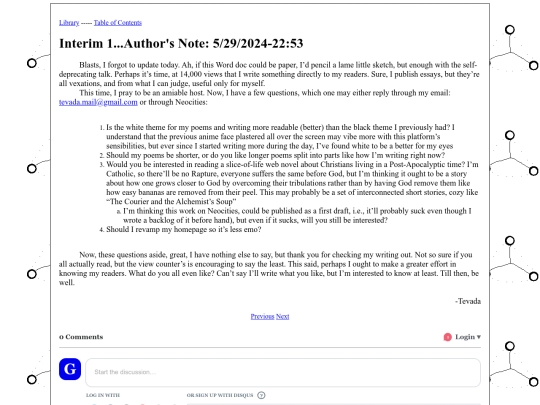
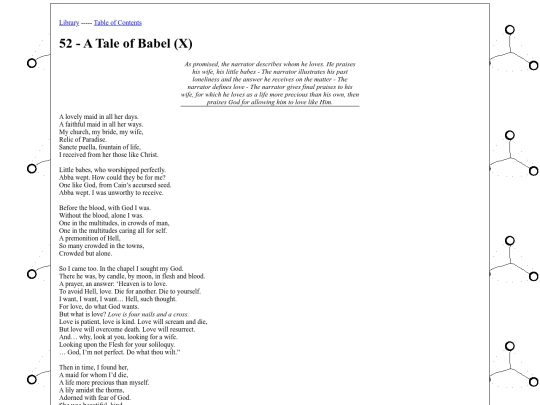















































Presenting 52.06 - The Justice of Inequality... The narrator re-introduces himself and notes of how apocryphal the current poems are in relation to his tale, however he promises to continue it for the sake of his sanity. Following this, he makes a discussion of the 2024 election season, and a peculiar thought he had associated with it, that women should not have an equal vote to a man.
Description done... now for legal reasons I'll say I'm not a sexist. I just don't think votes matter, or any form of government matters, for so long as the people are evil there will be no good society. People under God, saves, not government. This said, according to Aquinas the form of government most suitable for a kingdom of heaven is monarchy.
This said, I was born in a republic, so for the sake of future generations, I'd prefer a republic over civil wars for ridiculous new governments only imagined in the eyes of men. In a republic though, it must be a serious discussion on who should be allowed to vote, since the concept of "rights" has been taken too far so as to remove the rights of others.
By both practical and moral standards, votes should be handed to people most qualified, people who have the most stake in what's happening to the country. Soldiers are few compared to the multitudes who could at any passion of the media could either be crying for peace or war, yet they're the wons sent to war by popular opinion. In an ideal Republic, those deciding war should be those who've experienced it.
Now, to end, I'll probably copy what's said to here. I also take back what I said previously. By modern definitions, I would be a sexist. Yeah, I just don't think it's good for girls to suffer as much as men. It's tragic. There's nothing powerful about being trapped in a cubicle, but, guess good men are short in supply also. Even then, not many wives were treated well in the home. Ah well, that's the fruit for you.
As a woman, I don't work in a cubicle to feel powerful. I do it to provide for my family. I have a very disabled brother, and I don't trust anyone else to care for him. So I maintain my financial independence by working a cubicle job.
Suffering is inherent in life. There's no way to spare a woman from it, as long as we're alive on this earth. Everyone is going to face the challenges and toils of life.
I don't know, there's definitely some women who work to feel powerful. Which is kind of stupid in my opinion, because it seems the only people who are powerful in our society are those with an obscene amount of money. And beyond that, I'm not sure if I believe in a God, much less a Christian God, but I do believe there is a greater and powerful force at work in this world that we'll never fully understand.
@elilenti, Yeah I guess that's true. When those around us fail, it's our responsibility to raise ourselves. It's just not ideal though, those who should be responsible for others to slack in their duties. There's no way to spare people from all suffering, but we do have a responsibility to try.
And humanity has no hope in eclipsing this force in power.
Ellienti, I'll also say you're doing a good thing in working for your brother. To provide for those we love is the only reason why we should work. This said, God's with us, whether you believe or not. Still, for your benefit, I'd recommend you look up some Eucharistic miracles documented by Blessed Carlos Acutis. Now, may God be with. You have a tough life. God will help.